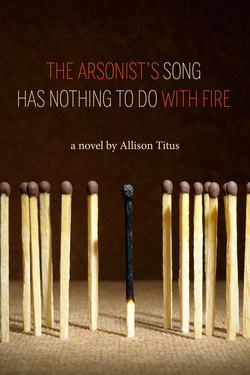Читать книгу The Arsonist's Song Has Nothing to Do With Fire - Allison Titus - Страница 27
На сайте Литреса книга снята с продажи.
ОглавлениеThree Pines Terrace was an arrangement of stucco buildings in block formation with a courtyard at the center and unwieldy shrubs growing ragged around the perimeter. Besides Three Pines there wasn’t much for a couple miles, just slack marshes punctuated by a bait shop and a Cash 4 Cars lot.
About a mile before the car lot, there was an abandoned house. Cracks at the eaves left pools of rainwater after storms; windows, busted, ushered in cold wind; the staircase creaked loudly, the stairs dipped noticeably at trespassing weight. It was kind of grand, hulked up from the plot of overgrown ivy and snake-thick roots, and one day, when Vivian’s mother said, “Pack your bags, we’re going on vacation,” that was where she meant. They were so young—maybe five or six—that the three-and-a-half miles from Three Pines must have felt suitably far from home, and the days they spent camping in the enormous, shadowy living room were perfectly removed from the rest of their lives. They took a tent and camping stove and canned food, and their mother was as close to joyful as they’d seen her, not scared of anything, not paranoid. She made soup and told them about Vesta, goddess of fire, and sea ghosts called Ashrays; flashlights on the tent made flames and waves.
Then they left. Crept back through the tangled yard, tripping over knots and roots, hoisting that crappy tent. After that vacation, they never returned. Vivian sensed that something had shifted, something that would prevent them from returning, would make returning impossible. They moved. The new apartment was smaller but roughly the same, with thin walls and plastic mini-blinds that always snapped loose from their cord.
Nothing was remarkable. Most things were the same. The years passed.
And then, one day, her mother put on a pair of thin white gloves cut to the elbows, took to her bed and did not leave her room for days, then weeks, lights off and the curtains pulled. Months passed. It was spring. There was no way to explain it: she’d stopped. Stopped cooking, stopped leaving, stopped working. She drew a check from the state and hunkered down. Called it witnessing. Called it preparing. She sat in the armchair and smoked, letting the ash build. She wouldn’t take off the gloves, refused to touch things with bare hands. Wouldn’t take the medication the doctors gave her, little sample boxes stuffed in her purse. Her hands shook. They were bad doctors, she said, they were men in coats who would kill her. The locks on the house got changed. Evade, evasive, evasion. Vivian didn’t know what to do. The house got cold. It was winter. It was another spring.
One morning, riding the bus to junior high, a car accident had traffic tied up and detoured. Along the new route, Vivian saw the house and realized with dread it was where they’d camped. There in a brackish pocket of forest. It was dilapidated, slanted low, with an anemic front porch that swung away from the wood siding and smashed windows. She couldn’t believe it.
And that house is where she went when, a few months later, she returned home from school to find her mother stockpiling nonperishables in the living room, building a whole color-coded wall of cans that already stacked halfway to the ceiling. It must have taken the entire day, which meant her mother had skipped work for the second time that week. She had a job at a factory clothing outlet back then, tagging polo shirts and pinning imperfect turtlenecks to mannequins. Vivian said why didn’t you go to work, and her mother said what she’d said the last time. Who cares about shirts, it’s too late. She stacked more cans. Vivian left, overwhelmed and claustrophobic. She wasn’t thinking where she was going until it occurred to her that she was walking toward the junior high and that she would pass the abandoned house if she kept walking east, and she kept walking east.
That was the year things changed. Vivian learned how to cook. How to clean, how to leave. She kept the word evasion in the back of her throat, made it the name for a new disease.
